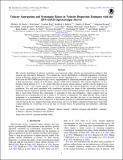Velocity Segregation and Systematic Biases in Velocity Dispersion Estimates with the SPT-GMOS Spectroscopic Survey
Author(s)
Zengo, Kyle; Ruel, Jonathan; Benson, Bradford A.; Bleem, Lindsey E.; Bocquet, Sebastian; Brodwin, Mark; Capasso, Raffaella; Chiu, I-non; Rapetti, David; Saro, Alex; Stalder, Brian; Stark, Antony A.; Strazzullo, Veronica; Stubbs, Christopher W.; Zenteno, Alfredo; Bayliss, Matthew B; Bulbul, Gul E; McDonald, Michael A.; ... Show more Show less
DownloadBayliss_2017_ApJ_837_88.pdf (990.5Kb)
PUBLISHER_POLICY
Publisher Policy
Article is made available in accordance with the publisher's policy and may be subject to US copyright law. Please refer to the publisher's site for terms of use.
Terms of use
Metadata
Show full item recordAbstract
The velocity distribution of galaxies in clusters is not universal; rather, galaxies are segregated according to their spectral type and relative luminosity. We examine the velocity distributions of different populations of galaxies within 89 Sunyaev Zel'dovich (SZ) selected galaxy clusters spanning 0.28 < z < 1.08. Our sample is primarily draw from the SPT-GMOS spectroscopic survey, supplemented by additional published spectroscopy, resulting in a final spectroscopic sample of 4148 galaxy spectra'2868 cluster members. The velocity dispersion of starforming cluster galaxies is 17 4% greater than that of passive cluster galaxies, and the velocity dispersion of bright (m < m- 0.5) cluster galaxies is 11 4% lower than the velocity dispersion of our total member population. We find good agreement with simulations regarding the shape of the relationship between the measured velocity dispersion and the fraction of passive versus star-forming galaxies used to measure it, but we find a small offset between this relationship as measured in data and simulations, which suggests that our dispersions are systematically low by as much as 3% relative to simulations. We argue that this offset could be interpreted as a measurement of the effective velocity bias that describes the ratio of our observed velocity dispersions and the intrinsic velocity dispersion of dark matter particles in a published simulation result. Measuring velocity bias in this way suggests that large spectroscopic surveys can improve dispersion-based mass-observable scaling relations for cosmology even in the face of velocity biases, by quantifying and ultimately calibrating them out. Keywords: cosmology: observations; galaxies: clusters: general; galaxies: distances; redshifts; galaxies: evolution ; galaxies: kinematics and dynamics
Date issued
2017-03Department
MIT Kavli Institute for Astrophysics and Space ResearchJournal
Astrophysical Journal
Publisher
IOP Publishing
Citation
Bayliss, Matthew B. et al. “Velocity Segregation and Systematic Biases in Velocity Dispersion Estimates with the SPT-GMOS Spectroscopic Survey.” The Astrophysical Journal 837, 1 (March 2017): 88 © 2017 The American Astronomical Society
Version: Final published version
ISSN
1538-4357
0004-637X